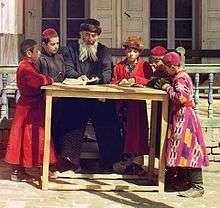History of the Jews in Uzbekistan
Uzbek Jews have two distinct communities; the more religious and traditional Bukharan Jewish community and the more progressive, Europe extracted Ashkenazi community.

The history of the Jews in Uzbekistan.
There were 94,900 Jews in Uzbekistan in 1989,[1] but fewer than 5,000 remained in 2007 (most of them in Tashkent).[2]
There are 12 synagogues in Uzbekistan.[3]
_(2).jpg)
Most Uzbek Jews are now Ashkenazi due to the immigration of Bukharan Jews to Israel and the United States.[4]
Fergana Jewish community
Semyon Abdurakhmanov is the head of the Fergana Jewish community. There are six synagogues in the Valley. There are several hundred Jews in Fergana, Namangan, and Kokand, with about 800 total in the area. Abdurakhmanov has said that the biggest problem faced by the Jewish Uzbek community is the economy.
During the Andijan Massacre in May 2005, the Israeli Embassy in Tashkent asked Abdurakhmanov to make a lists of Jews "in case there will be a need to airlift people to Israel."[3]
Historical demographics
| Year | Pop. | ±% |
|---|---|---|
| 1926 | 37,896 | — |
| 1939 | 50,676 | +33.7% |
| 1959 | 94,488 | +86.5% |
| 1970 | 103,058 | +9.1% |
| 1979 | 100,067 | −2.9% |
| 1989 | 95,104 | −5.0% |
| 2002 | 6,000 | −93.7% |
| 2010 | 4,500 | −25.0% |
Source:
| ||
The Jewish population of Uzbekistan (then known as the Uzbek SSR) nearly tripled between 1926 and 1970, then slowly declined between 1970 and 1989, followed by a much more rapid decline since 1989, when the collapse of Communism began to occur. According to the Soviet census, there were 103,000 Jews in Uzbekistan in 1970.[7]
Between 1989 and 2002, over ninety percent of Uzbekistan's Jewish population left Uzbekistan and moved to other countries, mostly to Israel.[8]
See also
References
- World Jewish Population 2001, American Jewish Yearbook, vol. 101 (2001), p. 561.
- World Jewish Population 2007, American Jewish Yearbook, vol. 107 (2007), p. 592.
- Uzbek Jewish worries Archived 2013-01-04 at Archive.today JTA
- Rift over root differences remains unmended for Jews of Uzbekistan Archived 2012-02-05 at the Wayback Machine Jewish Telegraph Agency
- "Приложение Демоскопа Weekly". Demoscope.ru. 2013-01-15. Archived from the original on 2013-10-12. Retrieved 2013-04-14.
- "YIVO | Population and Migration: Population since World War I". Yivoencyclopedia.org. Retrieved 2013-04-14.
- "The Jewish Community of Uzbekistan". The Museum of the Jewish People at Beit Hatfutsot. Retrieved 25 June 2018.
- "tab30.XLS" (PDF). Archived from the original (PDF) on 2014-07-14. Retrieved 2013-04-14.